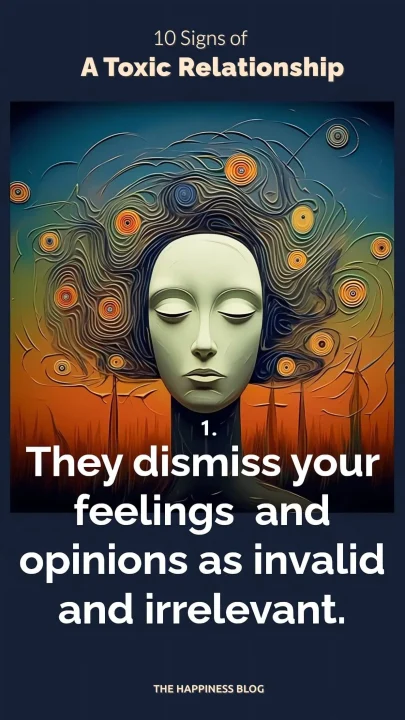Today's Thursday • 11 mins read
— By Dr. Sandip Roy.
One subtle sign you’re in a toxic relationship is that you keep feeling bad for a while after coming off meeting them.
Another, they use loaded statements. And they won’t explain whether it’s sarcasm or light banter. It triggers you.
These are the four subtle signs that you are in a toxic relationship:
- Walking on eggshells: You are highly stressed about what might anger them when around them. Any thoughts about this person fill you with anxiety and fear.
- Get assaulted for asking them to change: Your attempts to change them add more stress and toxicity to your relationship.
- Feel overly dependent on them: They make you co-dependent and trauma-bonded. You can’t bear how they make you feel, but you feel too helpless without them in your life.
- Have low self-worth: You believe you are not good enough, and that you’re to blame for everything wrong in the relationship.
- “A toxic relationship can be like a ticking time device, waiting to explode at any moment,” says Lisa Concepción, a narcissist abuse recovery coach.
- “It is better for someone to break your heart once by leaving your life, than for them to stay in your life and break your heart continually,” says Terry Mark.
10 Signs of A Toxic Relationship
“Toxic people” can be categorized as personalities who are prone to raising disputes.
This type of person brings out the worst in you. You lose your patience and calm after being with them for some time.
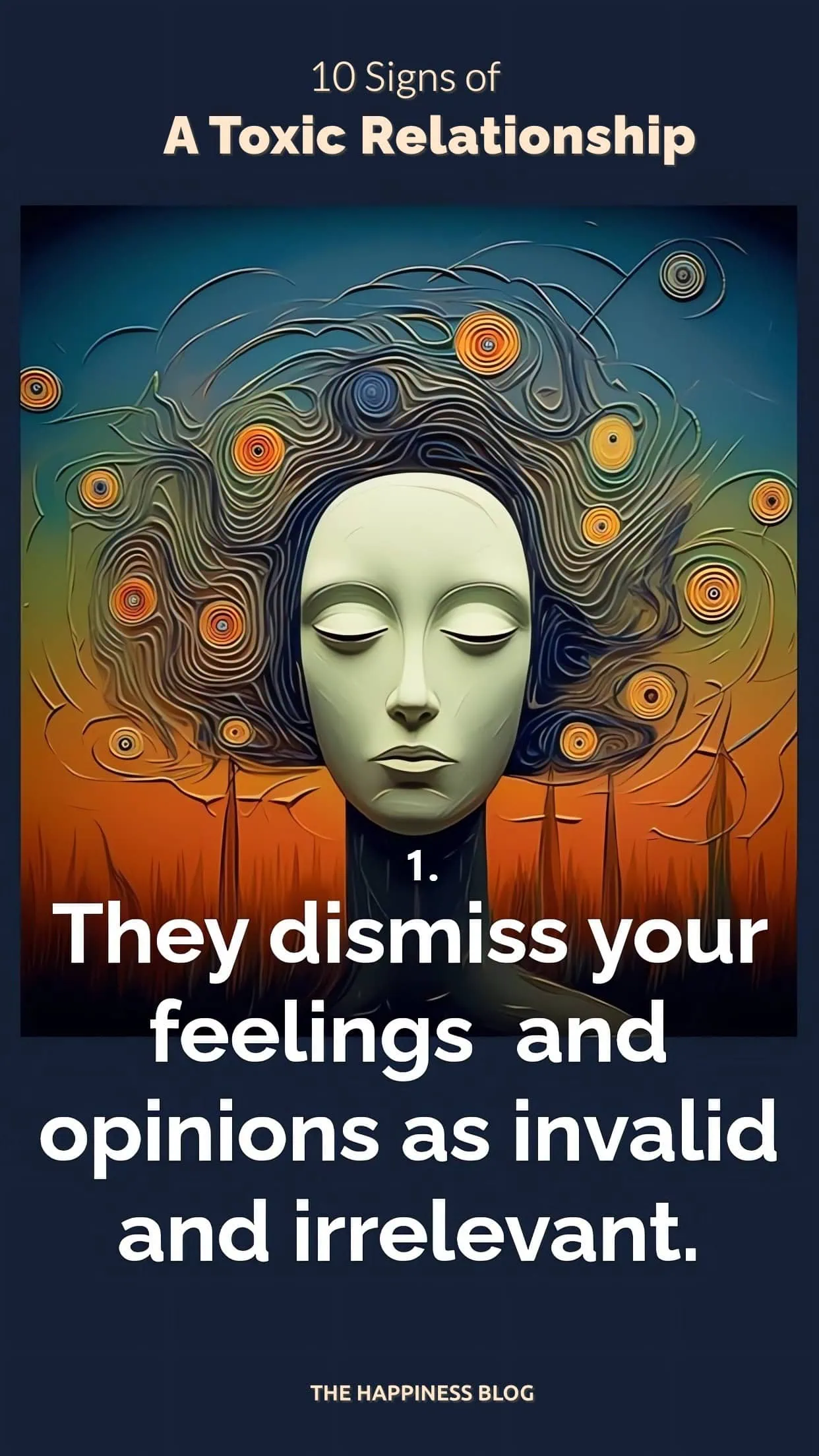
1. They Dismiss Your Feelings As Invalid.
A key early sign of a toxic relationship is the increasing lack of empathy and support.
They habitually dismiss your opinions, ideas, needs, and feelings as invalid. You feel unheard and unimportant around them. They show little interest in your life outside the relationship.
You often think, “Am I doing the relationship right?”
You feel unimportant, unheard, and severely lonely. And when you object, you get accused of being oversensitive or overemotional.
“Toxic people … are blissfully unaware of the negative impact that they have on those around them.”
— Travis Bradberry
[See the 20 red flags of a narcissist.]
2. They Emotionally Leave The Relationship.
An emotionally withdrawn partner stops engaging in the relationship. They become distant, indifferent, and unresponsive to your emotional needs.
They are just not emotionally available for you. Your joys don’t excite them. Your sadness doesn’t move them.
They stop making plans together or cancel the plans you make. They don’t communicate as much as they used to. Often, they won’t even respond to remove your confusion.
You feel like you are the only one invested in the relationship, unsure of where you stand.
- They take your efforts and kindness for granted.
- You feel trapped. No matter what you do, it’s never enough.
- They act like they are entitled to everything you do for them.
- They act out of duty or expectation of rewards, rather than love.
To numb the pain, you become an emotional zombie — expressionless, emotionless, and detached from your feelings.
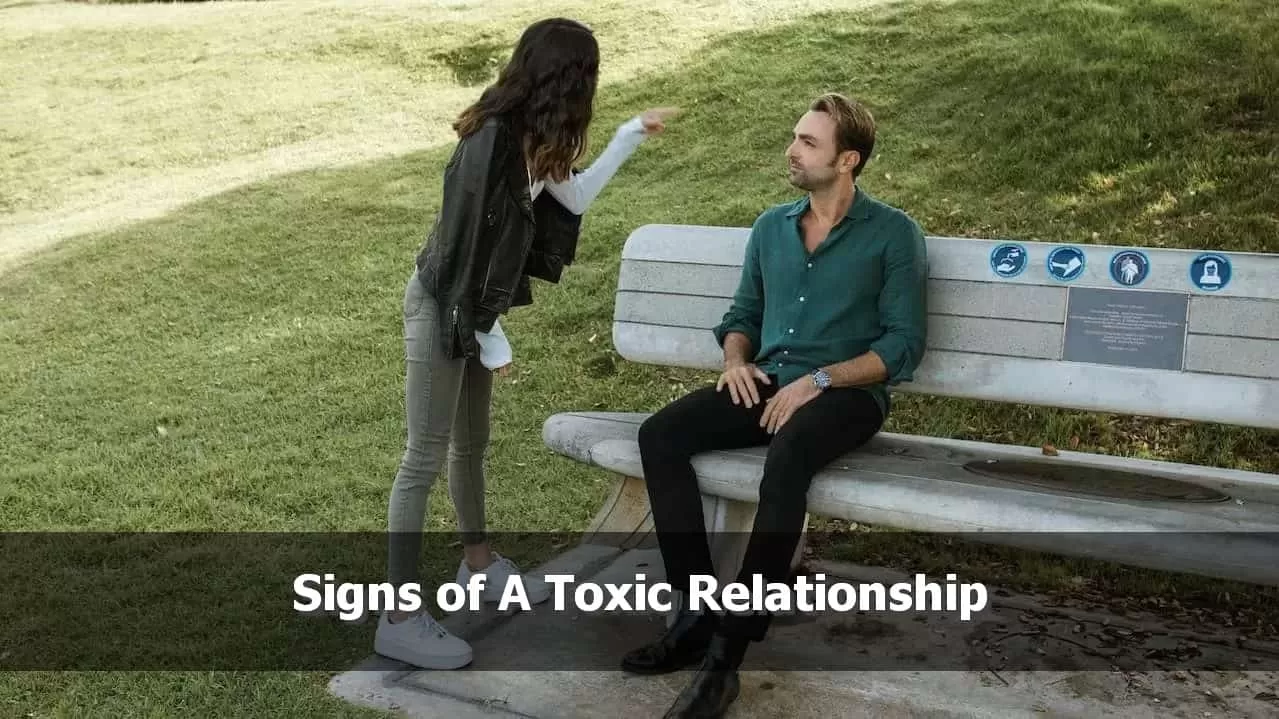
3. They Hollow Out Your Self-Confidence.
Another early sign of a toxic relationship is toxic communication. They are compulsively disruptive. Their talent for blame-shifting is so impressive that you might catch yourself apologizing for their toxic behavior.
They poke holes in your every opinion and idea, constantly criticize what you do, and make you doubt your abilities and self-worth.
Worse, many of them reveal the real sadist inside:
- They feel a secret satisfaction from creating chaos in your life.
- They push your buttons to provoke panic or rage.
- They can lead you down into harm’s way.
When you resist, they escalate the insults — publicly calling you useless and worthless, who deserves to be beaten.
They can make you feel like a helpless animal trapped in an electrified cage.
4. They Become Hostile, Cruel, And Abusive.
Toxic relationships can escalate into abuse: verbal, emotional, and physical.
- They can become unimaginably cruel and harmful without a warning.
- They can use anger, shame, and even alcohol or drugs to subdue you.
- They can hurt you so much that you may lose all your hopes of getting out or getting better.
Toxic lovers can even use sexual abuse as a way to punish the other person. It may include coercion, non-consensual acts, and pressure to engage in unnatural carnal acts.
The toxic person you love is probably damaged beyond repair. Don’t try to fix them, or mistakenly think your love can fix them.
5. They Seize Your Autonomy And Freedom.
Controlling behavior is another early sign of a toxic relationship.
They control your autonomy and freedom.
- They try to dictate your actions, decisions, and opinions.
- They can show they own you, and try to isolate you from friends and family.
- It’s not too alien to see them controlling whom you meet, what you wear, or how you spend your time.
- They feed you bad things about yourself, lessen your achievements, and make you feel like a “loser” — to whittle down your self-worth and confidence.
All to make you do what they want.
This bad relationship can make you doubt everything good you’ve ever felt about yourself.
“Toxic relationships are like a cancer that slowly eats away at you.”
—Dr. Ramani Durvasula
6. They Turn Jealous, Envious, And Resentful.
Jealousy, envy, and resentment are common in toxic relationships, especially in extreme or unjustified ways.
Your partner may become possessive, envious of your success and achievements, or jealous of your other relationships.
When you sit down and think about it, you find that most of their opinions and judgments of you aren’t relevant to your life. That person is simply using jealousy and possessiveness to control you.
Over time, you see the relationship getting worse and worse, snowballing into resentment and hostility. You do not realize that their behavior is most likely a projection of their own nature.
- Find time to read this: 8 Ways To Keep Your Cool Around A Narcissist.
7. They Lie, Cheat, Gaslight, & Triangulate.
They repeat the same emotional toxicity tactics: blame-shifting, gaslighting, narcissistic projection, dispute escalation, crisis creation, and manipulation. And they rarely change because they don’t take the time for self-reflection.
“No matter how beautiful a lie is, in the end it hurts even more than the truth would have done.”
— Terry Mark
If your partner starts to lie or deceive you, it can be a sign of a toxic relationship.
This can include half-truths, outright lies, gaslighting, triangulation, and cheating.
Gaslighting involves spinning intricate tales to make you doubt your reality. Triangulation involves pitting others against you or creating rivalry.
Even when you catch and confront them, they can scream at you for being “always suspicious.”
So, you get punished for pointing out what they did wrong.
“A toxic relationship can be like quicksand, slowly pulling you under.”
— Terri Orbuch
8. They Cut You Off From Your Loved Ones.
A toxic partner may try to isolate you from your friends and family. They might discourage or prevent you from maintaining your support network.
They can make you feel like you don’t need anyone else but them, or that your loved ones are not good for you.
Their excessive demands on your time and attention make you feel guilty for spending time with others.
You feel helpless when others ask you for your opinions. You can’t make your own choices and decisions without being validated by your partner; they made you codependent.
This leaves you vulnerable, yet unable to share your struggles with others.
You get pushed into intense loneliness. Along with sadness, fear, high alertness, and hostility, all forming a feedback loop, reinforcing each other, as this study found.
9. You Are Always Walking On Eggshells.
This is a big red flag. One of the 10 signs of a toxic relationship is that you are always walking on eggshells. Experts call it “emotional hypervigilance,” a state of chronic high stress.
You live in constant fear and anxiety about upsetting your toxic partner or friend. You’re afraid what action of yours might trigger them into a negative reaction.
“Emotional hypervigilance” is a high-stress state. It puts you on guard, , preparing yourself to deal with their anger, punishment, or harm at your slightest fault.
Your body is chronically flooded with cortisol (the stress hormone). It disrupts your sleep and memory, reduces libido, and compromises your immune system, making you more open to infections.
The perpetual threat of danger does not let you relax or be yourself. Your every effort is guided by one thought: “Will he/she approve this?”
You lose trust in yourself, and even in the very idea of love.
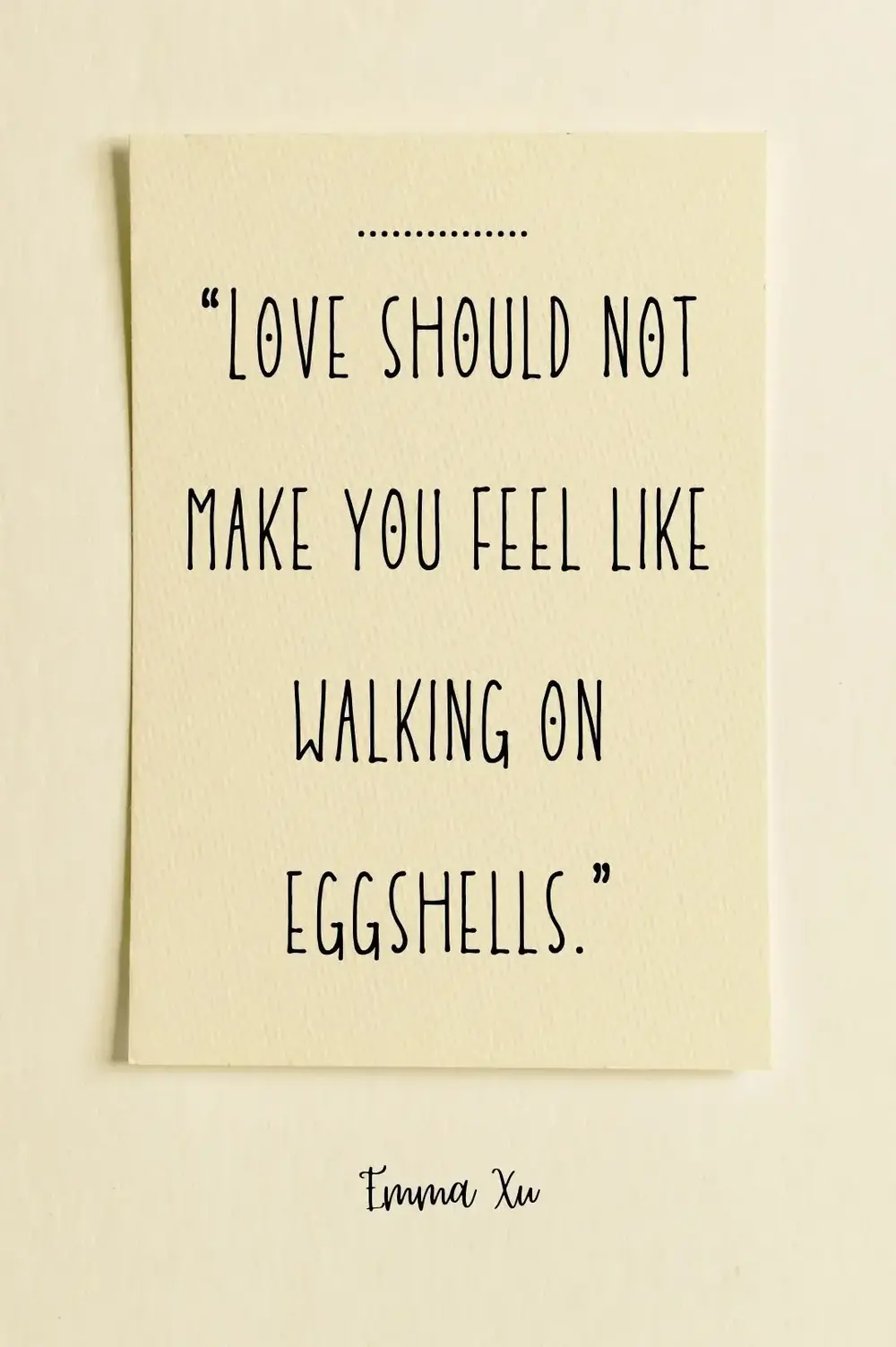
10. They Keep Justifying Their Toxic Behavior.
Toxic people blame other people or external circumstances for their mistakes. It’s their default.
They won’t admit they did something wrong, and even try to justify it when cornered. They can create elaborate dramas to make themselves look spotless while pinning it all on a scapegoat.
Worse, it can rub off on you. You may find yourself making excuses for your partner’s toxic behavior. You may try to justify their cruel actions. And even blame yourself for their aggressive behavior.
They twist narratives, hijack conversations, assign blame, make a villain out of you, and walk away from destroyed relationships with a clean conscience.
What To Do When In A Toxic Relationship?
Some ways you could respond to your toxic situation:
1. Record the abuse
- Controlling behaviors
- Criticism, belittling, and insults
- Show of excessive jealousy and possessiveness
- Attempts to isolate you from your friends and family
- Any abuse that made you uncomfortable or ashamed
Seek help immediately at the first sign of physical hurt. Contact your friends, family, colleagues, anti-abuse social groups, and legal authorities.
2. Develop a getaway plan
If you are in immediate danger, call emergency services right away.
If you are not in immediate danger but still feel unsafe, develop a safe getaway plan:
- Identify a safe place to go if you need to leave quickly
- Keep important documents and belongings in a safe place
- Create a code word to use with friends or family if you need help
- Not playing is the best move to win against a toxic partner/friend; give them the “gray rock” treatment until you have a getaway plan.
3. End the relationship
You have to give up on people sometimes, not because you don’t care, but because they don’t.
- Stop hoping things will change for the better; they won’t.
- Be clear and direct about your decision to end the relationship.
- Set physical and behavioral boundaries and strictly enforce them.
- Stay in constant touch with your support groups — friends, family, local authorities.
- Get a restraining order if they violate your space or are “seen” around your whereabouts.
You wish to get out of the toxic person’s reach, but feel overwhelmed imagining a life without them. And this is what keeps you from ending the relationship.
On one side of your breakup lie many fears — handling life’s challenges alone, autophobia, uncertainty about finding another person, social hesitation, people rejecting you, and financial hardships.
On the other side lies your safety, independence, and peace of mind.
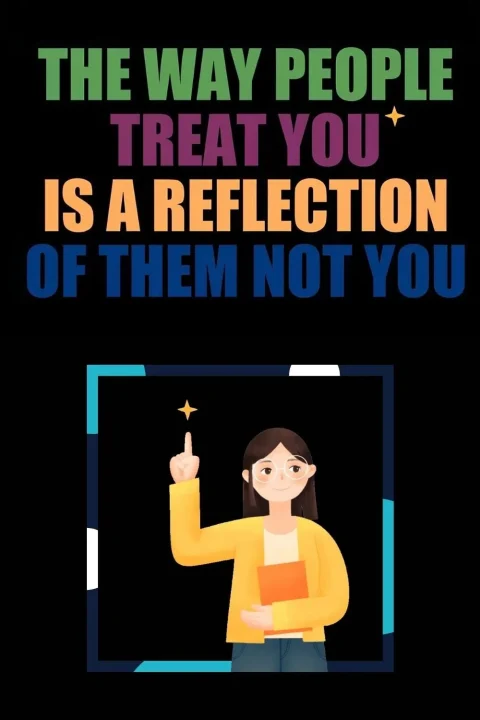
4. Seek Professional Help
- A therapist can provide emotional retraining and guide you through your healing process.
- They can help you see patterns in your past relationships and break those patterns moving forward.
- They help you realize that it is not selfish to prioritize your well-being, or give yourself love, care, and compassion.
“The most important thing you can do in a toxic relationship is to put yourself first. That means setting boundaries, seeking support, and taking steps to protect yourself from harm.” — Dr. Ramani Durvasula
How To Know If It’s Time To Move On?
- Trust your instincts: If something doesn’t feel right in your relationship, it probably isn’t.
- Don’t ignore red flags: Early signs of a toxic relationship can escalate quickly if left unchecked.
- Notice if your partner treats you differently: This can be an accurate sign of their true character.
- Take care of yourself: Prioritize your own well-being and don’t compromise your values or beliefs.
“The first time someone shows you who they are, believe them.”
— Maya Angelou
Final Words
“You can’t change someone who doesn’t see an issue in their actions. You can only change how you react to them.” — Unknown
From my clinical experience with relationship abuse victims, these are some ways to deal with a toxic person:
- Do not try to make them see their faults
- Do not ask them to change themselves
- Do not get them to agree with you
You deserve a healthy, loving relationship. They are not your only option. So never let this person decide what you do with your life.
When you end this relationship, don’t feel guilty. You’re making your peace your priority. Your life is bigger than what they made you think.
Charles Orlando has a powerful message: “You don’t let go of a bad relationship because you stop caring about them. You let go because you start caring about yourself.”
√ Also Read: How To Quit A Toxic Relationship?
√ Please share this with someone.
» You deserve happiness! Choosing therapy could be your best decision.
...
• Disclosure: Buying via our links earns us a small commission.
